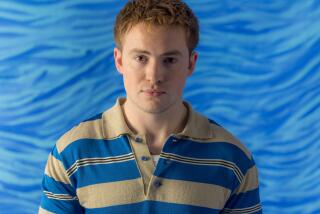As middle-aged Prince Philip, Tobias Menzies explores his interior life in ‘The Crown’
London — When “The Crown” recast its leading roles for the third and fourth seasons, there was a lot of speculation about who would take over playing Prince Philip from Matt Smith. But seeing Tobias Menzies sink into the controversial royal figure during the third season of the Netflix series, which is helmed by writer Peter Morgan, it’s clear he was meant to take on the character. Menzies’ complex performance landed him a Golden Globe nomination for lead actor in a television drama, as well as a SAG Award ensemble nod.
The British actor, who is in production here on the fourth season of “The Crown,” was surprised by the news, especially since he didn’t realize the series was even eligible this year. “It’s always nice to be recognized for these things,” he says, speaking by phone. “A lot of work goes into it. I’m really proud of what we made.”
Was the audition process for “The Crown” difficult?
I’m going to piss everyone off, but no, it was actually quite easy. Not easy, exactly — I had to go and do 11 pages with Olivia Colman for the camera. But it was just the one audition. A week and a half later it was a go. I was expecting to have to jump through a lot more hoops. But it fell into place. I had a decent lead time, a few weeks or so to prep it, so I worked up the voice. I watched a lot of footage and did a session with a voice coach. The technical challenge all the way along is that it can’t just be an act of mimicry.
Netflix’s ‘The Crown’ returns with Olivia Colman as its stunning new matriarch and a riveting, 1960s-set season that may be its strongest yet.
How much pressure is involved with playing someone who is such a public figure?
It adds a layer of responsibility, partly just technically. He’s someone who’s so well known, and everyone knows how he talks and how he moves. So you have to speak and move like him. And there’s an extra thing of “What if they watch it?”
Do they watch it?
They basically don’t say either way. “The crown doesn’t comment.” I think that’s the motto.
Is your performance based more on the man himself or on the script?
In terms of movement and vocals, you’re definitely going back to the real person. But in terms of the Philip we create on the show, that is partly Peter’s imagining of Philip. It’s a version of Philip that works for the story that we’re telling. Obviously, a lot of the scenes that we’re portraying no one knows — they’re works of fiction. The breakfasts and dinners behind closed doors and the domestic scenes are all in the DNA of the show, and that’s Peter’s imagining of what might go on.
The whole show is hung on the history of that institution of our country and the different periods — this is 1964 to 1977 — and within that there’s a lot of interpretation going on. I feel like I often have to repeat the fact that this is definitely a work of fiction. We are portraying real people, but I don’t think anyone’s claiming it’s a definitive interpretation of who these people are.
For three seasons, Netflix’s “The Crown” has inspired viewers to research the royal family and British history. Wikipedia and Google data bear that out.
Did you discuss the character with Matt Smith when you took over the role?
No. I know him, but that would have felt like an odd conversation. I don’t know what that conversation would look like, really. I went back and watched what he did in the first two seasons, and I really like it. It was a really useful resource. But you have to do the work and work out what you want to do with it and take the role on going forward.
By the time we find him in Season 3, do you think Philip is satisfied with his role in the royal family?
He certainly has acclimatized. He seems to be chafing at the bit less. We’re entering a more middle-aged period for both of them, and he seems to have found his feet. Episode seven is a meditation on Philip’s difficulty with sitting within that institution, which is part of Seasons 1 and 2 as well. This is another exploration of that when he becomes obsessed with the astronauts and the moon landing. It forces him to wonder about the decisions that he’s made within his life.
Philip is often painted as a bad guy in the press. Were you able to find his merits in this portrayal?
The honest truth with the real person is it’s very, very hard to tell. They’re quite guarded, both him and the queen. Having watched a lot of footage of Philip and having read about him a lot, I find him quite a hard man to pin down. That makes him interesting to play. I feel like, essentially, “The Crown” is a benign portrayal of the family. It’s not looking to expose them or defame them. It’s more about leadership and nationhood and what it means to belong, and family and what these institutions are. I always feel that one’s job as an actor when playing a role is to advocate as much as one can from inside and make that person understandable to a viewer.
More to Read
Only good movies
Get the Indie Focus newsletter, Mark Olsen's weekly guide to the world of cinema.
You may occasionally receive promotional content from the Los Angeles Times.










